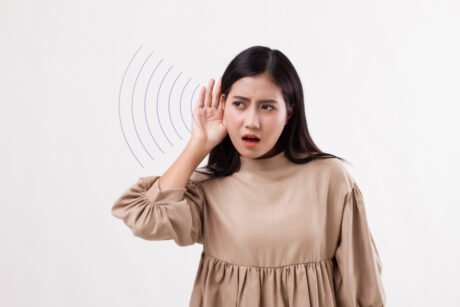“Are you even listening to me?” It’s a phrase many of us have uttered, or had aimed at us. We often joke about ‘selective hearing,’ lightheartedly attributing it to someone tuning out or simply choosing not to pay attention.
But what if that seemingly ‘selective hearing’ isn’t a choice at all? What if it’s a subtle, underlying sign of something more significant, like undiagnosed hearing loss?
In this blog, we’ll explore the nuances between occasional distraction and genuine hearing difficulty, helping you identify when it might be time to take your hearing seriously and seek professional help.
What Is ‘Selective Hearing’?
In its most casual sense, ‘selective hearing’ refers to the act of only hearing certain sounds while ignoring others—meaning it can be understood psychologically as an unconscious filtering process.
Perhaps you’ve been engrossed in a book and didn’t hear your name being called, or you’ve missed your partner’s instructions while simultaneously trying to manage dinner and a demanding child.
In these instances, ‘selective hearing’ is often just a byproduct of distraction, multitasking, or a temporary lack of attention.
When ‘Not Listening’ Might Be a Sign of Hearing Loss
While true ‘selective hearing’ is a mental act, there are clear signs of hearing loss that can mimic it. If you frequently experience the following, it might be more than just you tuning out your surroundings:
- Constantly Asking Others To Repeat Themselves: You catch bits and pieces, but often need clarification.
- Turning Up The Volume: Whether it’s the TV, radio, or phone, you find yourself needing it louder than others do.
- Struggling in Noisy Settings: Restaurants, social gatherings, or crowded places become particularly challenging. You might hear sounds, but not distinguish words.
- Complaining That Others Are Mumbling: This is a common indicator, as certain speech frequencies become harder to perceive, making voices sound indistinct.
- Feeling Exhausted After Social Interactions: The effort required to strain and piece together conversations can be mentally draining.
Mild hearing loss often goes unnoticed, or the signs are easily dismissed as ‘just getting older’ or attributed to poor acoustics. The brain is incredibly adaptive and will try to fill in the gaps, making it difficult to pinpoint the exact moment when listening becomes a struggle rather than a choice.

The Impact on Relationships and Communication
Whether it’s genuine ‘selective hearing’ or undiagnosed hearing loss, the impact on relationships can be profound. Unrecognised hearing issues often lead to frustration and misunderstandings on both sides.
Imagine real-life scenarios: missed dinner invitations, arguments over perceived communication lapses, or the emotional toll of feeling constantly ignored by a loved one. The speaker might stop sharing details because they feel their words aren’t being received, leading to emotional distance.
Simple Tests You Can Try at Home
If you suspect your ‘selective hearing’ might be something more, here are a few simple observations you can try:
- Switch Ears During A Phone Call: Do you notice a significant difference in clarity or volume between your left and right ear?
- Cover One Ear In A Quiet Setting: Can you still clearly understand someone speaking at a normal volume with the other ear? Try this for both ears.
- Notice Patterns In Missed Cues: Do you struggle more in group conversations than one-on-one? Are noisy environments consistently problematic?
These informal tests are not diagnostic but can offer valuable clues about whether a professional assessment is warranted.
When to Get a Professional Hearing Test
While occasional lapses in attention are normal, certain signs should prompt you to seek professional advice from a licensed audiologist in Singapore.
- Persistent Difficulties: If difficulties aren’t just in noisy rooms but also in quiet settings.
- Family/Friends Commenting: Sometimes, those closest to us notice changes before we do. Take their observations seriously.
- Sudden or Uneven Hearing Loss: If you notice a sudden drop in hearing, especially in one ear, seek immediate medical attention.
Remember, addressing hearing health with an ear check-up in Singapore early can prevent further decline and mitigate the impact on your quality of life.
Listen Closely to What Your Ears Are Telling You
Not every instance of ‘selective hearing’ is harmless or merely a sign of distraction. Sometimes, it’s the subtle whisper of an underlying hearing disorder. Recognising the difference is the first step towards better hearing and better connections.
So, whether you’ve started to notice some of the signs of hearing loss we’ve discussed, or you simply want the peace of mind that comes from a comprehensive check-up, the next step is clear and simple. Schedule a professional hearing test at the Listening Lab today to get the definitive answers you and your family deserve.










